We know that this is a very heated topic and that many advocates in the animal welfare world might immediately be defensive when they hear the phrase “Adopt or Shop Responsibly”, but we ask that you read this article with an open mind before throwing the phrase out altogether.
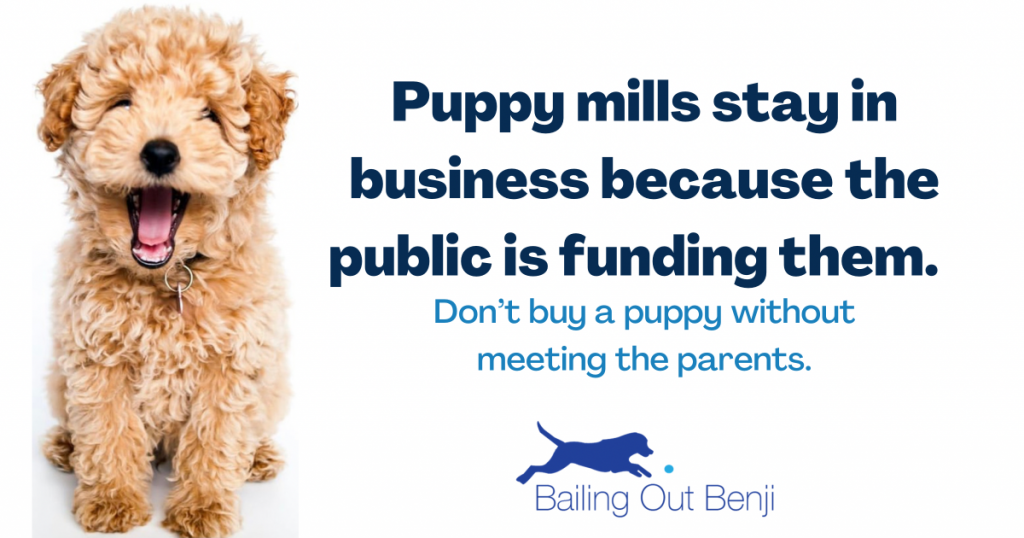
Puppy mills, puppy stores, click-and-ship websites, and even unethical rescues (gasp) thrive because of consumers who don’t ask questions or they specifically target those who might not know enough about finances to make ethical decisions when obtaining a new puppy. This confusion became very clear when we exposed the puppy-laundering scheme that occurred after puppy mills began obtaining nonprofit statuses and rescue licenses. How were customers supposed to know where their animals were actually coming from when everyone involved said they were ‘rescues’. To learn more about that, please listen to Sony’s podcast “The Puppy Kingpin”, which covers our work in-depth.
Consumer literacy plays a very important role in our everyday lives, including pet acquisition. These animals will share our lives for ten, fifteen, sometimes twenty years! It is extremely important to know what you are getting into. Is this breed right for me? Do I actually need to take a loan out with 200% interest to buy an animal in a store? Am I ready for a pet that needs me to make them a part of my entire life? These questions, and more, should be asked ahead of time, but many buy or adopt on impulse.
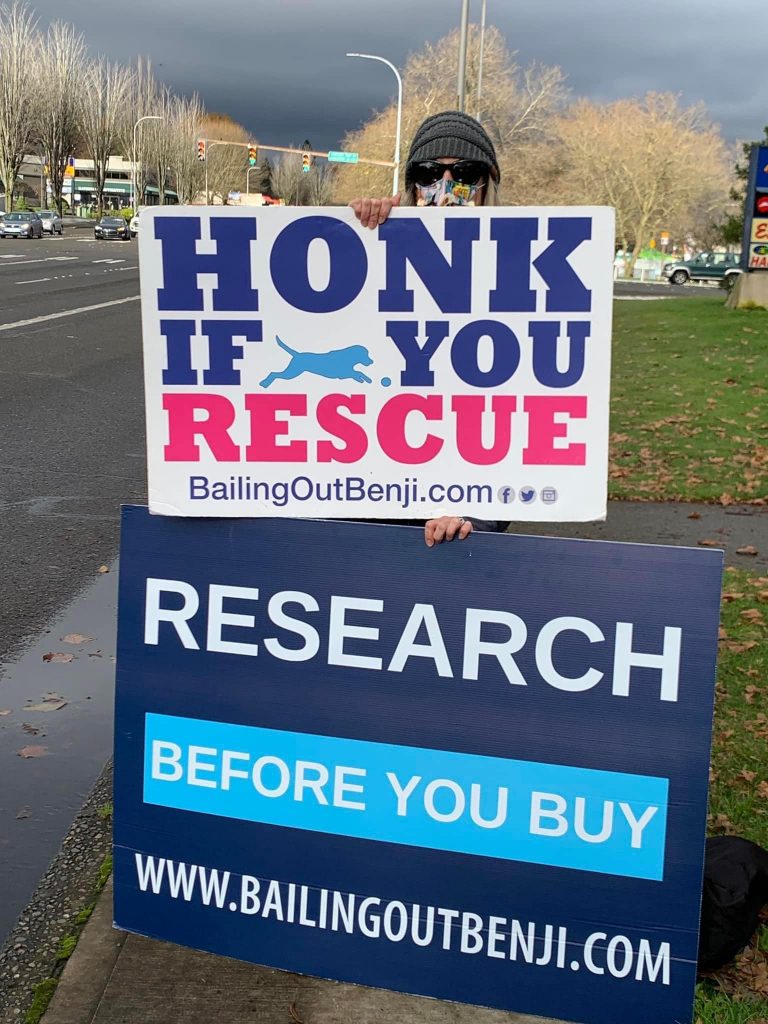
So why do we believe in adopting OR shopping responsibly?
As a nonprofit that is committed to ending puppy mill cruelty we know that we live in a world of gray and we also know that we are facing three types of consumers.
- “Adopt don’t shop” consumers
- “Never adopt” consumers
- Consumers who are open to both options
The American Pet Products Association (APPA) reported in their National Pet Owners Survey that about 23% of dog owners and 31% of cat owners acquired their pets through impulse purchases. These purchases are often made without thorough research or planning. Would those percentages be so high if we had a more effective way of reaching and educating those potential customers?
If people are going to buy either way, shouldn’t there be a safeguard in place to make sure that they aren’t buying from animal mills? While we wish that everyone would adopt the animals who are waiting for families in shelters and rescues, that isn’t the reality of the world we are living in.
The “Adopt Don’t Shop” crowd gets it. They understand our message that puppy mills are bad and they will never buy! They are out there advocating for pets in shelters and rescues every single day. They are networking and getting animals into their forever homes and helping to limit pet euthanasia in their communities! But what about the other two categories of consumers? That leaves millions of potential customers left out of the conversation. If the “Adopt Don’t Shop” message doesn’t reach them, then it is our responsibility to meet those customers where they are at and try to help them make the best possible choice for their family while doing as little harm as possible to the animals involved.
We cannot rescue our way out of pet overpopulation. Animal welfare organizations must acknowledge that there are people who will buy their next pet and try to at least give them tips on how to avoid puppy mills.
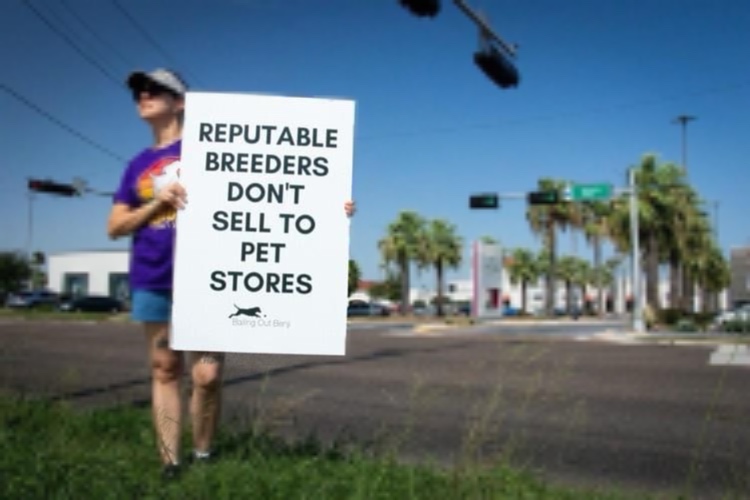
“Don’t Breed or Buy While Shelter Dogs Die”
Are all breeders puppy mills? No, absolutely not. While some might disagree with the practice of breeding animals on any level, they should at least be able to acknowledge that not all breeders are forcing animals to live in cruel conditions or over breed them. Again, this doesn’t mean that you have to believe that breeding animals is morally okay, but calling all breeders puppy mills isn’t factual and actually does harm when it comes to trying to address this issue legislatively.
This is the ‘world of gray’ that we are living in and are trying to get advocates to work towards.
Many preservation breeders go to the capitol or city council meetings to educate policy makers about puppy mills and how reputable breeders are different. Let us be clear, responsible breeders have changed a lot of minds when it comes to policy and have helped pass laws that crack down on puppy mills and puppy-stores. They have become an extremely important ally and often risk a lot to speak out.
They also aren’t the reason why dogs are in shelters.
Many, many anti-puppy mill advocates will repeat the phrase “Reputable Breeders Don’t Sell To Pet Stores”. They will even go to council meetings and list all of the reasons why, some of which include:
- The majority of AKC breed clubs have rules against selling to stores or puppy mills.
- Reputable breeders do genetic testing to make sure the adult dogs and puppies will be healthy.
- Reputable Breeders have contracts and require that their puppies come back to them (at any age) if the family can no longer care for them.
However, those same advocates will often go on to say “Adopt Don’t Shop”. Heck- we still have protest signs that have that type of language because that phrase is so well-known and adored by many. But we have numerous pieces of anecdotal evidence from rescue organizations that responsible breeders do step up and go to great lengths to adopt their spayed/neutered offspring back if they are left at a shelter.
To be clear: Shelter overpopulation is a huge problem, but so much of that has to do with a lack of community support and education. Spay/Neuter initiatives, pet food pantries and low-cost veterinary care goes a very long way in helping your local shelters receive no-kill status. When your local animal welfare organizations are investing in these community programs, you will often see a community with less of an overpopulation problem. This is a crucial role that animal welfare organizations must play in their communities in order to see fewer issues with pet overpopulation. If you are saving animals in a community, it is responsible to also be investing in the community programs that will eliminate the need for future assistance.
Another big issue for communities can be puppy-selling stores who sometimes import thousands of unaltered puppies from out-of-state mills. These unaltered puppies are then sold to random people who might have accidental litters or might breed haphazardly, causing the future offspring to wind up in shelters. When one puppy-store can/does import over 1,000 puppies a year (fact based on our research), those animals can multiply quickly and overburden a city’s resources surprisingly fast.
Is it just pet stores that do that though? Are pet stores the only ones importing dogs? The short answer is no. Whether shelters are working together to move animals out of high-euthanasia areas to areas with more adoption possibilities or adoption agencies are receiving animals directly from breeders, thousands of animals are moving each month to their next destinations. The positive there is that reputable adoption agencies spay and neuter their pets before they find new homes and don’t add to additional overpopulation issues.
Can rescue agencies ever be problematic?
Unfortunately, yes. Yes they can. Before we jump into this extremely heated topic, please read the following email regarding a rescue that we regularly receive complaints about. Names and location have been redacted.
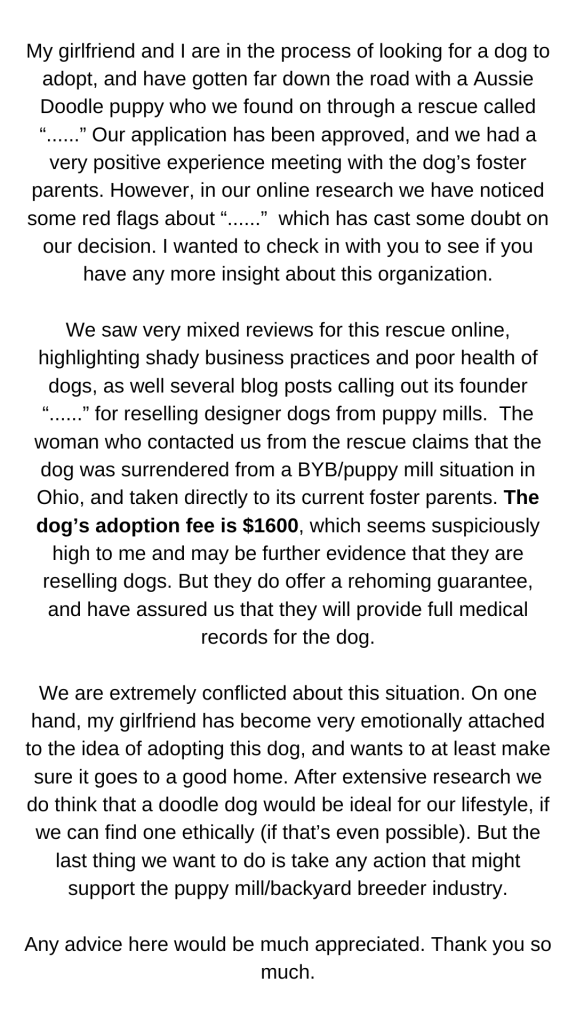
This email references a rescue that we have had dozens of questions about in the last few months. At least once a week someone emails us and asks us if this specific (and redacted) rescue is okay to work with. Since our work against sham rescues began, so did a steady stream of messy questions from the public who wanted to know if the rescue they were supporting was legit or a ‘sham’. This became tougher and tougher for us to answer as time went on and the lines continued to get blurry. That is a problem.
The difference that we were easily able to explain was that, no, the rescue you are wanting to adopt from is not an actual front for a puppy mill as we saw in our case vs JAKS puppies (referencing the Puppy Kingpin Podcast above and this article). What is harder to explain is when people ask us if specific rescues financially support or enable puppy mills, like you saw with the email above.
Here are a few very real scenarios that we are seeing, which result in some of those messy questions.
- Rescue #1 regularly attends dog auctions and spends whatever they need to get the dogs out. No cost is spared and they might not even mind bidding against other rescues to get the dogs they have on their list. However, this rescue is open with their donors and supporters about attending auctions and they fundraise specifically to go.
- Rescue #2 goes to dog auctions but they have minimum bids and usually don’t budge on those minimums (however high or low they might be). This rescue might not be the most transparent with their supporters about going to said auctions or how much money they spend buying dogs.
- Rescue #3 doesn’t go to any dog auctions, but they get all of their puppies and young/adult dogs from a dog broker in their state who gives them the medical cases, the aged out puppies and the retired adults. While we aren’t sure if money is traded, we do know this adoption organization has high adoption fees. This rescue typically doesn’t take owner surrenders but instead works directly with a puppy mill broker for a constant supply of animals.
- Rescue #4 will not pay for dogs, but often gets puppy mill surrenders due to their proximity to breeding facilities. These places might be downsizing or closing, but often they are just handing dogs over when they no longer serve a purpose for the facility. They are open about getting dogs from puppy mills and even educate their supporters about this cruel industry.
- Rescue #5 gets a lot of young puppies and/or highly adoptable breeds, they don’t disclose specifically where they come from. The transport documents we collect show that they regularly get dogs from problematic breeders, but there is no transparency about money being exchanged when it comes to communicating with their donors and supporters.
- Rescue #6 and/or the local shelter helps authorities with a puppy mill shut down and take all of the dogs they are able to. No money is exchanged.
Can you see why this is hard for the public to decide who to support or why it is hard for us to answer whether or not a place to adopt from is ‘legit’?
Is it okay for rescues to buy dogs as long as they are transparent to their donors and adopters? Is it okay for them to work directly with breeders to regularly get dogs from them, whether or not money is exchanged?
These questions become even tougher when advocates are working with policy makers and the pet industry poses the same question “why aren’t we allowed to source puppies from the same facilities that the rescues are getting dogs from?” Whether or not local rescues are actually buying dogs, the pet industry asks this question every. single. time. “Retail Rescue” is a term that has been coined by the pet industry and has made its way into the mainstream. So from a consumer perspective, how are they supposed to know what the right thing to do is?
Whether or not an organization will admit it publicly, there are some bad rescues out there, just like there are bad breeders. Should we turn a blind eye because we want animals to find homes? Or do we speak out and educate about unethical rescue practices as well?
Much like how there are responsible breeders and there are puppy mills, there are also good rescue organizations and not-so-good ones. We need to ask these tough questions to determine if the rescue organization is doing their best to eliminate the harm that is being done to animals and people.
At the end of the day, organizations that are honest and transparent with their donors and adopters aren’t the ones that we get questions about.
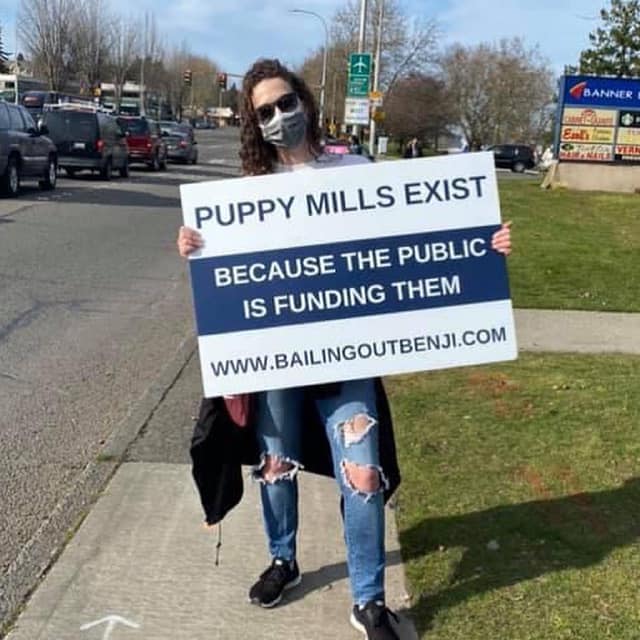
Adopt or Shop Responsibly.
So now we circle back to this statement. Adopt or shop responsibly. What does that really mean? To a person who doesn’t want to give any money to the puppy mill industry, that means they need to not only avoid pet stores and online brokering websites but they also need to ask big questions of adoption agencies they want to get a pet from. Responsibly is the key word there, but we all get caught up in the “adopt or shop” part of the phrase.
The fastest way for us to end puppy mills, is to use our collective voice against them. We need animal advocates AND responsible breeders to use their platforms to educate about this cruel industry and advocate for stronger laws. It can no longer be ‘us’ vs ‘them’. In order to be successful for the dogs, we need to find that common ground and work together to end puppy mill cruelty once and for all.
For consumers: The only way to do anything in a responsible way is to ask questions and research before you exchange money. Being an educated consumer will help you navigate the pet acquisition world more easily.
If you are looking to buy: Do not exchange money for an animal without doing your research and asking questions. Google the breeder, reach out to us to see what we know, and visit the facility. “Show Me The Mommy” is a campaign that we launched to encourage new families to create a relationship with their potential breeder in order to visit and see how the parent dogs are living. Beyond these things, you should always ask the breeder if they have done any genetic health testing on the parent dogs to ensure that the parents and puppy are healthy. OFA testing is the most common and in-depth. You should also avoid puppy-selling stores and click-and-ship websites when looking for your next puppy. You can read more tips on finding a reputable breeder here.
If you are looking to adopt: Generally speaking, you can’t go wrong when it comes to adopting a pet from an adoption agency. Thousands of amazing animals are waiting for you at your local rescue or shelter and we always encourage looking there first. If you are someone who has a strong stance against puppy mills and want to ensure that your rescue agency isn’t funding that industry, there are some questions you can ask.
*If you are noticing that a rescue often has a lot of young dogs or highly adoptable breeds, you can ask them questions as a donor, supporter or potential adopter. Where do they get the puppies? Do they exchange money for them? Do they pull from local shelters too? You can also ask them how much they spend on dog acquisition annually and what the breakdown of those costs are (shelter pulls vs commercial breeder costs). If you aren’t comfortable with the answers you receive or if the adoption fees are skewing higher, we suggest continuing your search for a new pet!
For advocates: The most responsible way to move forward with our mission to end puppy mill cruelty means that we have to acknowledge the world of grey that we live in. Not every family will adopt and not every breeder is a puppy mill. How can we keep evolving and learning so our educational efforts reach the consumers that need our message the most? By educating without shame and our personal biases, we can keep taking money out of the puppy mill industry by re-routing those customers elsewhere.
For those who are still reading: Thank you for staying with us through this lengthy article. We know that you might not agree with everything we posted, but we appreciate you staying for the conversation. By learning and listening to different viewpoints, we are able to challenge our movement to evolve and continue to do better for the animals and people who love them. We have said it before and will say it again, we wish everyone would adopt their next pet but it is our role to make sure people don’t get their next pet from a puppy mill.
